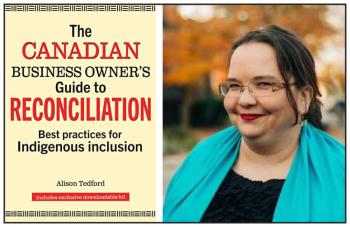Image Caption
Summary
Local Journalism Initiative Reporter
Windspeaker.com
Alison Tedford Seaweed is confident that the timing of her new book, The Canadian Business Owner’s Guide to Reconciliation, is spot on. She believes business owners want to do the right thing, but just don’t know how.
“I do think that there is a lot more concern around understanding how to participate in making a difference in light of recent findings…and I hope that (my book) is helpful in contributing to those conversations that are really important,” said Seaweed. She is a Nakwaxdaʼxw woman, a Kwakiutl First Nation member and an Indigenous communications professional based in Abbotsford, B.C.
The announcement of the 215 unmarked graves at the former Kamloops Indian Residential School on May 27, 2021 was the catalyst that started Canadians talking and brought attention to the world about the appalling treatment of Indigenous children at residential schools in Canada.
“This is a conversation that is happening now. I wish it were happening sooner,” said Seaweed, especially considering it’s been almost eight years since the final report from Truth and Reconciliation Commission (TRC) on the legacy of Indian residential schools.
In that 2015 report, the TRC offered a wide-ranging set of 94 Calls to Action that encompassed the reconciliation work that needed to be undertaken by all levels of government, public institutions, the education, health and justice systems, and more.
Businesses are addressed in Call 92 and that’s the specific focus of Seaweed’s book.
Call to Action 92 calls upon the corporate sector to adopt the United Nations Declaration on the Rights of Indigenous Peoples as a reconciliation framework. It would see businesses then “commit to meaningful consultation, building respectful relationships…”; ensuring equitable access to training, jobs and education for Indigenous people; and educating management and staff on the history of Indigenous peoples.
One of the unique aspects about Seaweed’s approach to encouraging businesses to move forward on reconciliation is her focus on moral obligation instead of reaping the economic benefits.
“I think there has been a lot of literature around the benefits of diverse organizations and how diverse organizations tend to make more money, but for me, from a moral perspective, I felt uncomfortable focusing on that when this is a response to the TRC’s recommendations on making things right around genocide. I felt uncomfortable (pushing) ‘it’s also going to make you a lot of money’,” said Seaweed.
Seaweed observed that business owners and companies would rather place their monetary support behind community groups and community causes.
“I think that consumers have a desire to ensure that the funds that they spend are aligned with the values that they have,” she said. “There have been a lot more businesses talking about what their values are and where they stand on things and I think that it’s an important time to be clear about where we stand on important social issues.”
The Canadian Business Owner’s Guide to Reconciliation offers a step-by-step approach to revisiting those values so that they impact the workplace directly.
The guide looks at how to create Indigenous opportunities, which fall under subtitles like “broadening your horizons” and “eliminating systemic barriers”.
Seaweed also examines building intercultural competency in the workplace, dealing with conflict resolutions, and educating the workforce on human rights.
The final chapter in the guide is entitled, “Reimagining the workplace with Indigenous people in mind.” There she talks about “decolonizing wellness” and diversity, equity and inclusion.
The guide is full of specific examples of what can be done. These examples come through extensive research and interviews Seaweed conducted with academics, business owners, and Indigenous relations advisors. Seaweed has more than 10 years of experience in cross-cultural communication and education.
“I think that people would generally like to be able to provide options that are suitable and appropriate for employees or customers or people who are engaged with their businesses and don’t always know where to start,” said Seaweed.
To that end, the guide is a tool for business leaders seeking to increase equity, inclusion and diversity while avoiding the pitfalls of performative action and well-intentioned missteps.
And if there’s one point the guide makes clear it’s that all actions need to be deliberate if a meaningful relationship with Indigenous people is to be cultivated.
Seaweed isn’t concerned that business owners or entrepreneurs will be turned off by the hard work that is involved.
“I think that there’s so much excellence and opportunity in working with Indigenous communities and Indigenous people and we bring so much to the table and having ways to work better together and having more insight into each other, that’s something that I hope will create empathy and understanding,” said Seaweed.
“One of the biggest things to fear is missing out on the opportunity to integrate Indigenous perspective into your business, into your world, into your life.”
The Canadian Business Owner’s Guide to Reconciliation hit the shelves Feb. 23 and is available for purchase on self-counsel.com, goodminds.com and Amazon.ca.
Never miss a Windspeaker article. Subscribe Today to our new Windspeaker Newsletter!
Local Journalism Initiative Reporters are supported by a financial contribution made by the Government of Canada.

